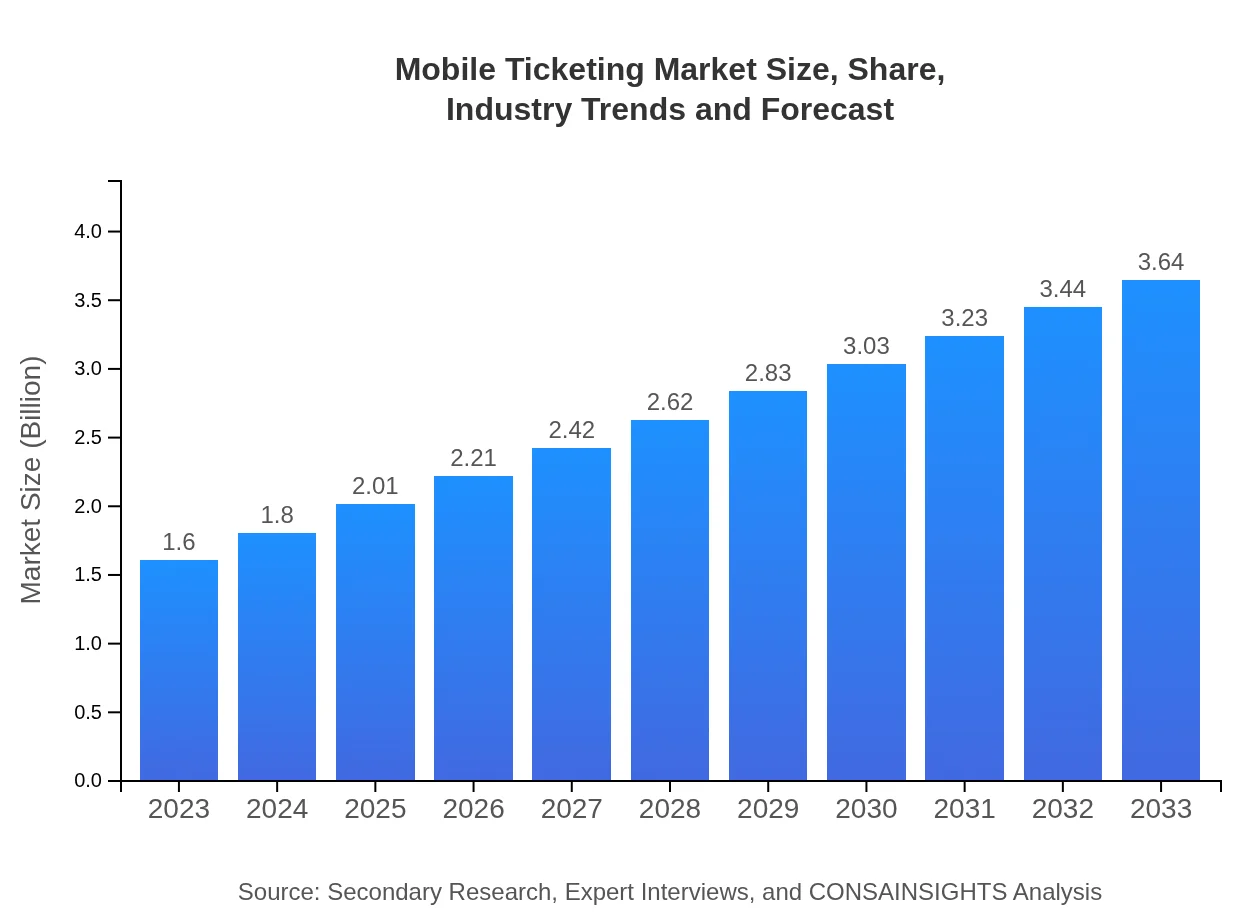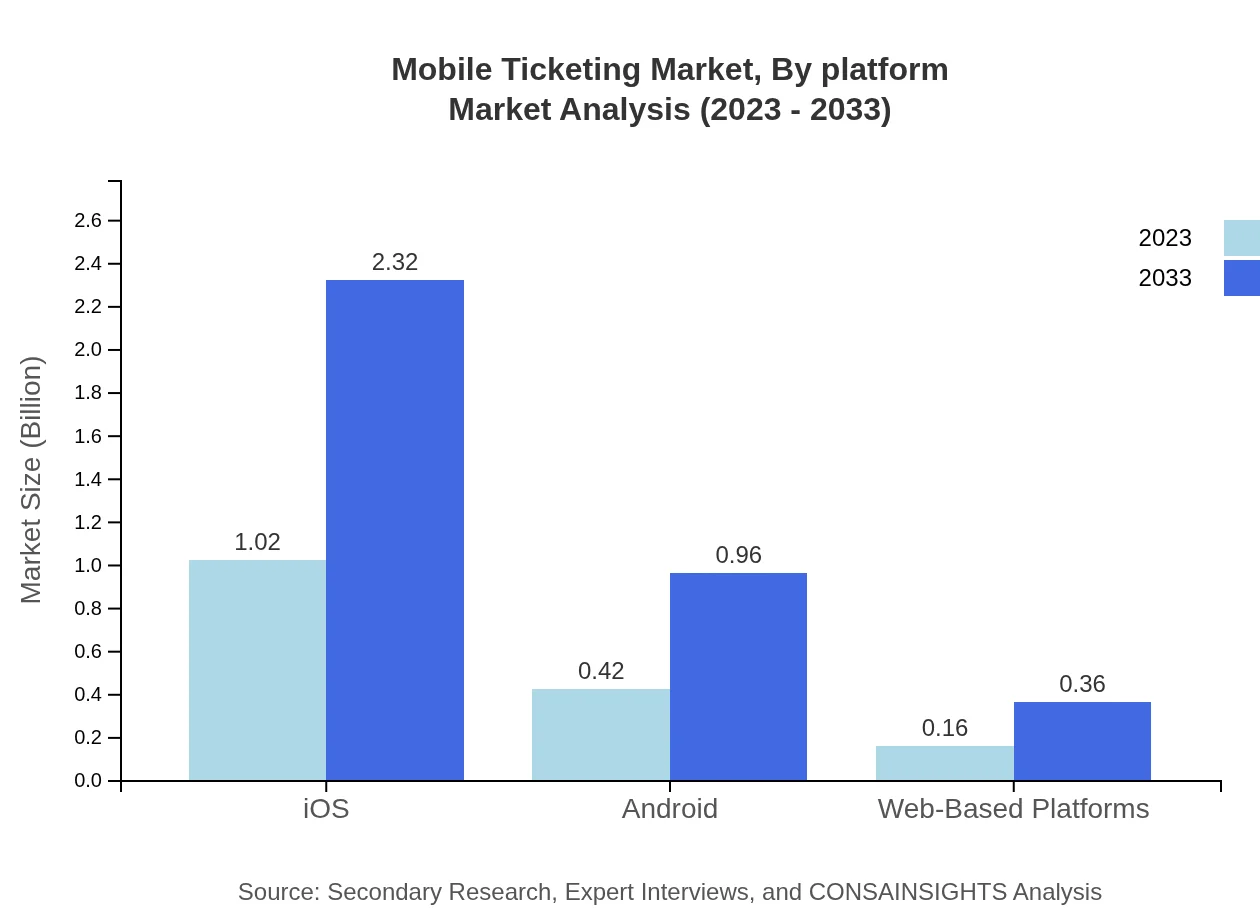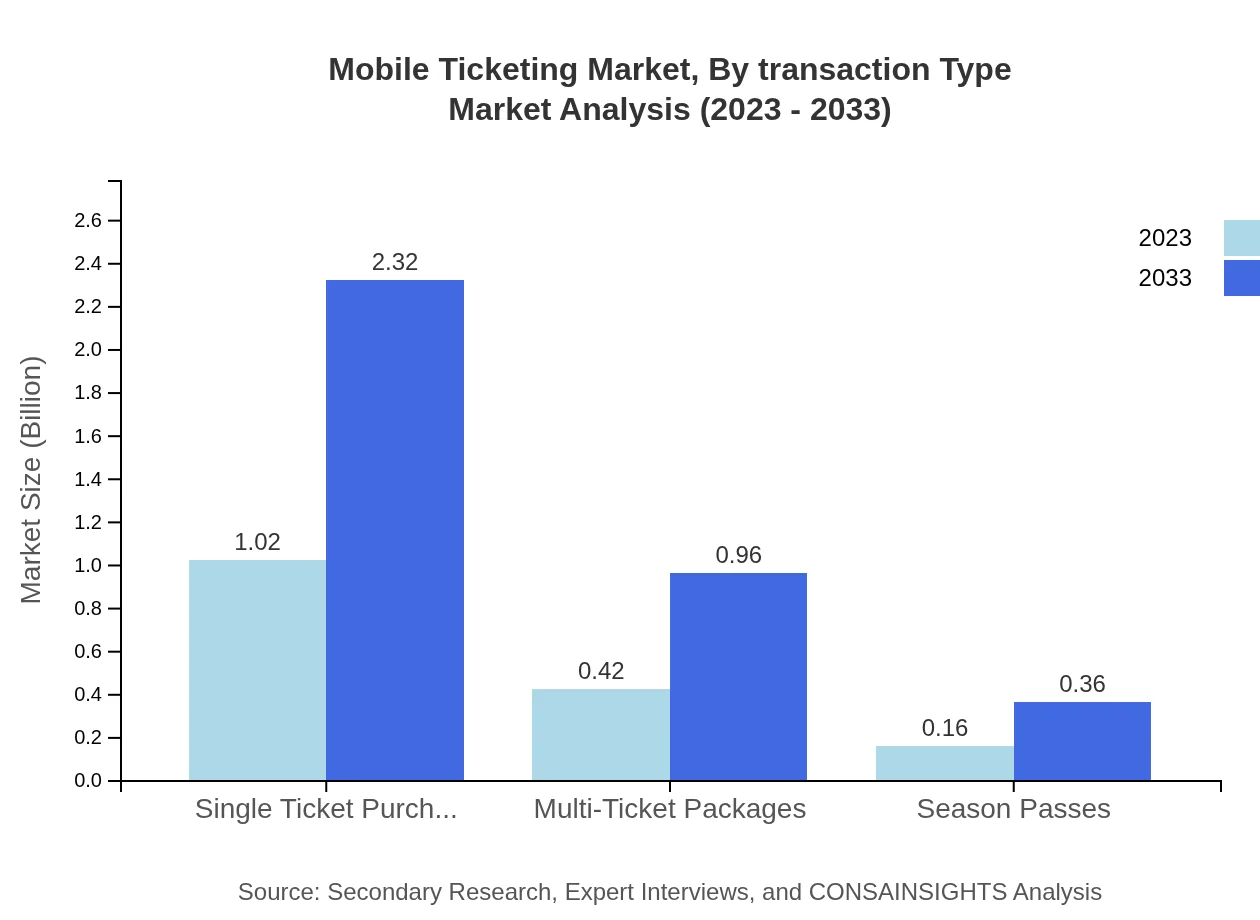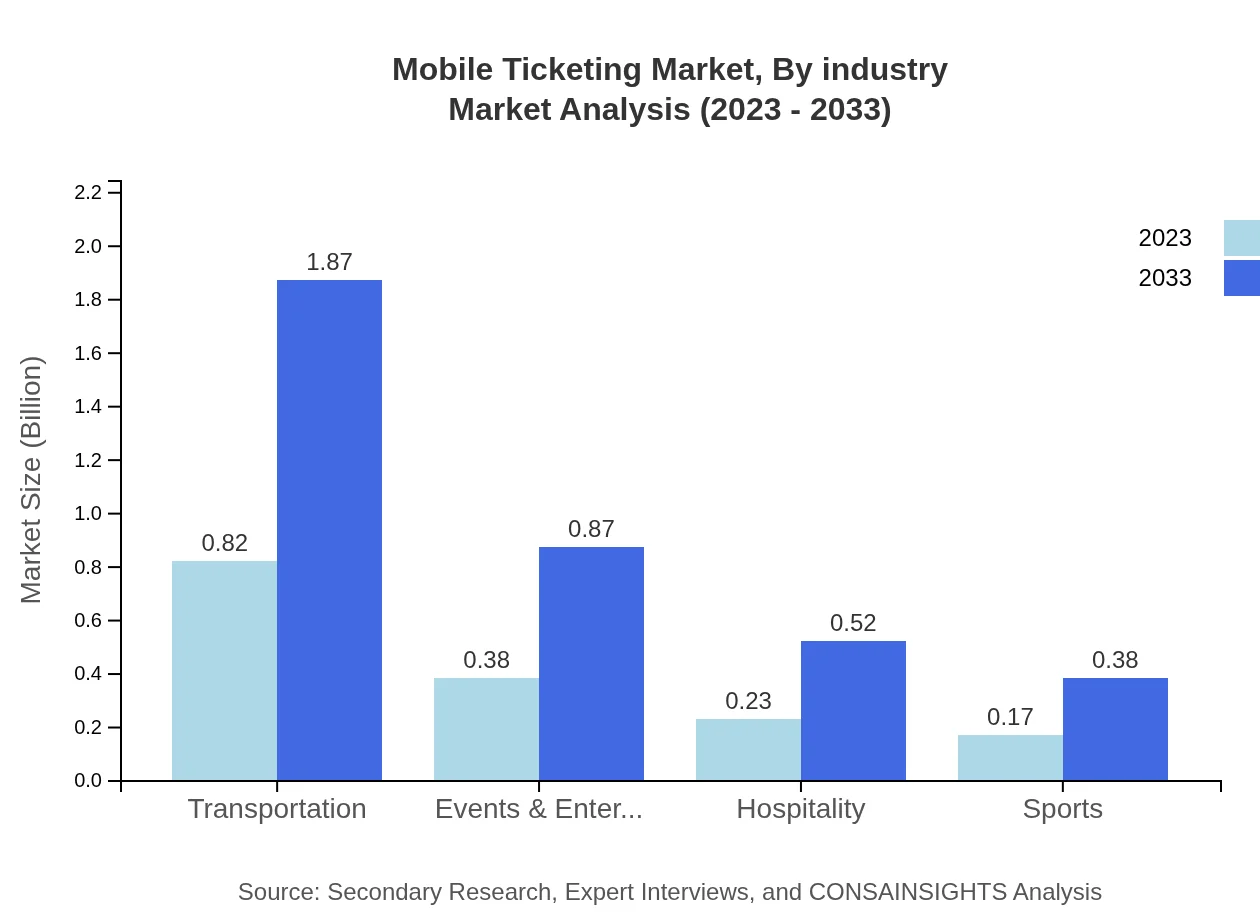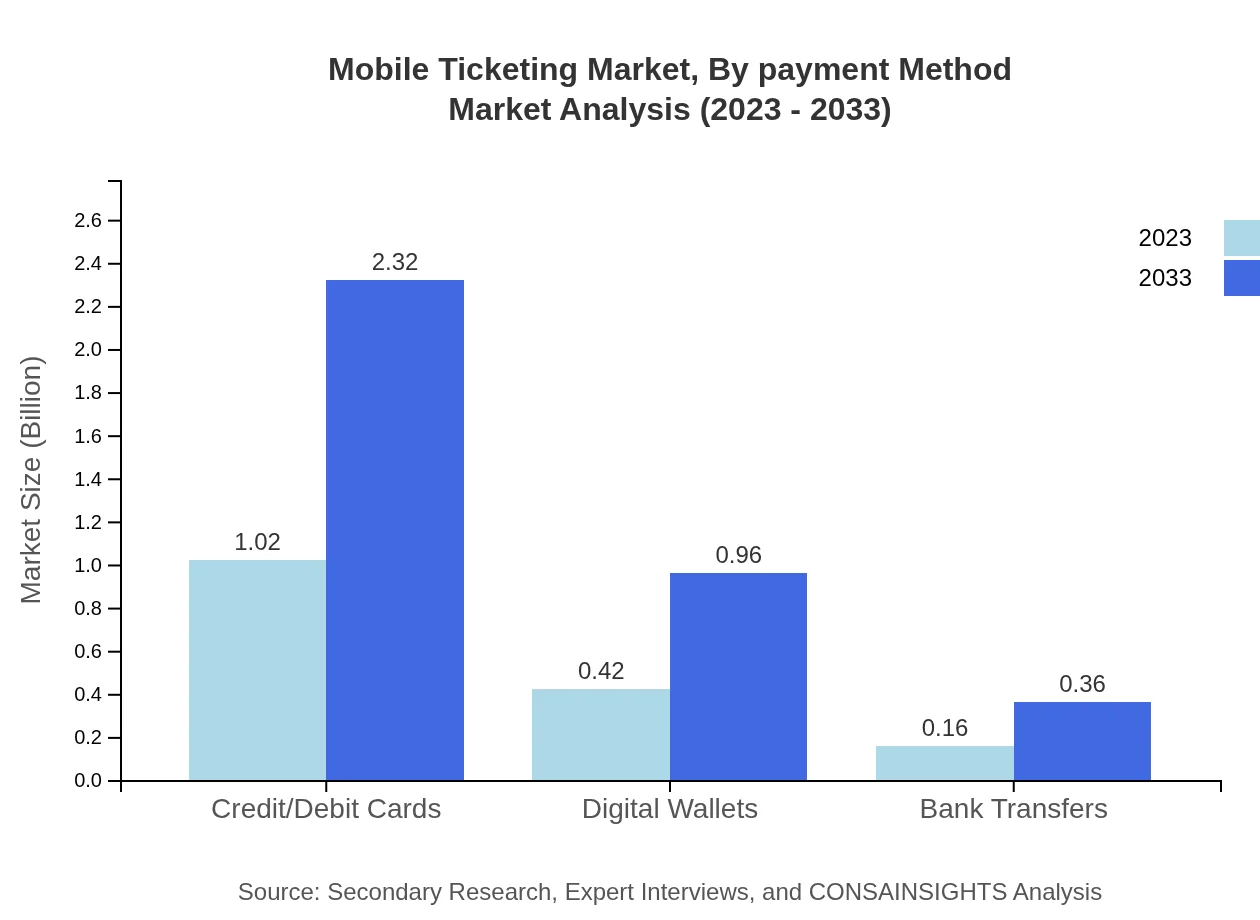Mobile Ticketing Market Report
Published Date: 31 January 2026 | Report Code: mobile-ticketing
Mobile Ticketing Market Size, Share, Industry Trends and Forecast to 2033
This report provides comprehensive insights into the Mobile Ticketing market, including its size, growth trends, technology advancements, and key players. The forecast period for this analysis is from 2023 to 2033.
| Metric | Value |
|---|---|
| Study Period | 2023 - 2033 |
| 2023 Market Size | $1.60 Billion |
| CAGR (2023-2033) | 8.3% |
| 2033 Market Size | $3.64 Billion |
| Top Companies | Eventbrite, Ticketmaster, Trainline, StubHub |
| Last Modified Date | 31 January 2026 |
Mobile Ticketing Market Overview
Customize Mobile Ticketing Market Report market research report
- ✔ Get in-depth analysis of Mobile Ticketing market size, growth, and forecasts.
- ✔ Understand Mobile Ticketing's regional dynamics and industry-specific trends.
- ✔ Identify potential applications, end-user demand, and growth segments in Mobile Ticketing
What is the Market Size & CAGR of Mobile Ticketing market in 2023?
Mobile Ticketing Industry Analysis
Mobile Ticketing Market Segmentation and Scope
Tell us your focus area and get a customized research report.
Mobile Ticketing Market Analysis Report by Region
Europe Mobile Ticketing Market Report:
The European Mobile Ticketing market is projected to expand from USD 0.51 billion in 2023 to USD 1.17 billion in 2033. Significant investment in digital transformation across the transportation and event industries, combined with supportive government initiatives toward cashless societies, drives this growth. Increasing acceptance of mobile applications for ticketing enhances user convenience and promotes market dynamics.Asia Pacific Mobile Ticketing Market Report:
In 2023, the Mobile Ticketing market in the Asia Pacific region is valued at USD 0.30 billion and is projected to reach USD 0.69 billion by 2033. The region is rapidly embracing digital solutions driven by urbanization and technology adoption in countries like China, India, and Japan. High smartphone penetration and a growing trend in cashless transactions further propel the market growth, especially in the transportation and event sectors.North America Mobile Ticketing Market Report:
North America's market size is estimated at USD 0.54 billion in 2023, increasing to USD 1.23 billion by 2033. A robust infrastructure for technological integration and consumer readiness for digital payments make this region a leader in mobile ticketing solutions. The presence of strong market players also contributes to accelerated adoption across various events and transportation sectors.South America Mobile Ticketing Market Report:
The South American Mobile Ticketing market is expected to grow from USD 0.07 billion in 2023 to USD 0.16 billion in 2033. Although the market is currently small, the rising smartphone usage and increasing penetration of payment solutions are catalyzing its development. This growth is especially notable in tourist destinations where event attendance and transportation ticketing are shifting towards mobile platforms.Middle East & Africa Mobile Ticketing Market Report:
In the Middle East and Africa, the market is set to grow from USD 0.18 billion in 2023 to USD 0.40 billion by 2033. Adoption rates are driven by consumers seeking more efficient and secure payment options. Increased tourism and participation in international events highlight the potential for mobile ticketing growth across this region, mostly in urban centers.Tell us your focus area and get a customized research report.
Mobile Ticketing Market Analysis By Platform
In 2023, the iOS platform dominates the Mobile Ticketing market with a valuation of USD 1.02 billion (63.82% share), while Android captures USD 0.42 billion (26.32% share). Web-based platforms account for USD 0.16 billion (9.86% share). By 2033, the iOS segment is expected to expand to USD 2.32 billion, maintaining its leading position. The Android platform is projected to grow to USD 0.96 billion, while web-based platforms will reach USD 0.36 billion.
Mobile Ticketing Market Analysis By Transaction Type
The market for Single Ticket Purchases leads with a size of USD 1.02 billion in 2023, representing 63.82% of the market share, while Multi-Ticket Packages are valued at USD 0.42 billion (26.32% share). Seasonal Passes constitute USD 0.16 billion (9.86% share). By 2033, Single Ticket Purchases are expected to rise to USD 2.32 billion, whereas Multi-Ticket Packages will increase to USD 0.96 billion and Seasonal Passes to USD 0.36 billion.
Mobile Ticketing Market Analysis By Industry
Transportation remains the largest segment with USD 0.82 billion in 2023 (51.46% share), followed by Events & Entertainment with USD 0.38 billion (23.85% share), Hospitality with USD 0.23 billion (14.25% share) and Sports at USD 0.17 billion (10.44% share). The Transportation segment is projected to reach USD 1.87 billion by 2033, with Events & Entertainment expected to reach USD 0.87 billion, Hospitality to USD 0.52 billion, and Sports to USD 0.38 billion.
Mobile Ticketing Market Analysis By Payment Method
The use of Credit/Debit Cards dominates the payment methods in Mobile Ticketing, with a market size of USD 1.02 billion in 2023, capturing 63.82% of the share. Digital Wallets follow closely at USD 0.42 billion (26.32% share), while Bank Transfers account for USD 0.16 billion (9.86% share). By 2033, Credit/Debit Cards are expected to grow to USD 2.32 billion, Digital Wallets to USD 0.96 billion, and Bank Transfers to USD 0.36 billion.
Mobile Ticketing Market Trends and Future Forecast
Tell us your focus area and get a customized research report.
Global Market Leaders and Top Companies in Mobile Ticketing Industry
Eventbrite:
A leading platform in event ticketing, Eventbrite offers services to creators and attendees, helping increase event attendance and streamline ticket handling.Ticketmaster:
As one of the largest ticket sales and distribution company, Ticketmaster provides an extensive range of ticketing services across various sectors, including sports and live events.Trainline:
Specializing in train ticketing across Europe, Trainline provides a seamless platform for purchasing and managing travel tickets digitally.StubHub:
A marketplace for ticket resale, StubHub allows consumers to buy and sell tickets, consolidating a wide range of events and ticket types.We're grateful to work with incredible clients.









FAQs
What is the market size of mobile Ticketing?
The global mobile-ticketing market is valued at $1.6 billion in 2023, with a projected compound annual growth rate (CAGR) of 8.3%, reaching substantial growth by 2033.
What are the key market players or companies in this mobile Ticketing industry?
Key players in the mobile-ticketing market include TransLink, Eventbrite, Ticketmaster, and others, which leverage technology to streamline ticket purchasing and improve user experience.
What are the primary factors driving the growth in the mobile Ticketing industry?
Growth is driven by increased smartphone penetration, adoption of digital payments, convenience, and rising demand from sectors like transportation and entertainment.
Which region is the fastest Growing in the mobile Ticketing?
The fastest-growing region is North America, with the market size projected to grow from $0.54 billion in 2023 to $1.23 billion by 2033, showcasing significant demand.
Does ConsaInsights provide customized market report data for the mobile Ticketing industry?
Yes, ConsaInsights offers customized market reports to cater to specific needs and queries in the mobile-ticketing sector, ensuring relevant data and insights.
What deliverables can I expect from this mobile Ticketing market research project?
Expect comprehensive deliverables including in-depth reports, market analysis, regional insights, segment breakdowns, and tailored recommendations according to client needs.
What are the market trends of mobile Ticketing?
Emerging trends include the shift toward contactless transactions, integration of digital wallets, and rising popularity of mobile apps for enhanced user engagement.

